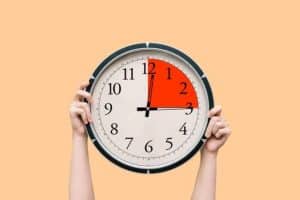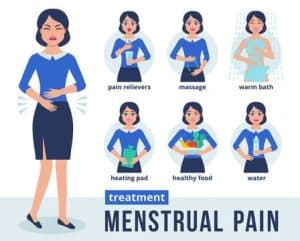A range of circumstances can affect a period to be early. If this occurs every once in a while, it is likely no cause for alarm, as variations in the menstrual cycle are common.
So Is the early period normal?
An early period here and there usually isn’t a reason for concern.
Everyone’s menstrual cycle is different. Your cycle begins on the first day of your current period and ends on the first day of your following period.
A regular cycle lasts anywhere from 21 to 39 days, so the number of days used bleeding varies from person to person. Most people bleed for two to seven days.
If your cycle is oftentimes shorter than 21 days — bringing you to bleed earlier than you typically do — it could be a sign of something underlying.
Early periods frequently result from hormonal changes, particularly during puberty and perimenopause.
Various underlying medical conditions can also result in menstrual irregularities.
In this article, we would illustrate various causes of an early period, as well as their symptoms and treatments.

1. Puberty
Puberty refers to the period during which adolescents attain sexual maturity.
Puberty typically starts between ages eight and 13. It’s driven by chemicals in your body called reproductive hormones. These hormones will continue to affect your menstrual cycle throughout your child-bearing years. They also facilitate the bodily changes often related to the transition to maturity.
These changes include:
- Growth in height and weight
- Enlarged breast tissue
- Enhanced fat storage in the buttocks, legs, and hips
- Increased hair growth on the arms, armpits, legs, and pubic area
- Skin changes, such as elevated oil production, acne, and blemishes.
2. Intense exercise
Intense exercise can result in irregular periods or cause your period to stop totally. Most often, this situation is correlated with athletes who train for several hours every day. It’s most popular in sports with weight regulations, like gymnastics and ballet.
Exercise only simulates your periods when you burn way more calories than you eat. Absent of adequate energy, your body doesn’t generate the number of reproductive hormones it needs to ovulate typically.
3. Perimenopause
Perimenopause, the growth to menopause, usually commences between the ages of 47 and 51.
Your hormone degrees fluctuate wildly during this time, and you may not ovulate every month. This can result in irregular periods, so you may menstruate sooner or later than regular.
Perimenopause can similarly result in:
▪ missed periods
▪ periods to be lighter or heavier than normal
▪ difficulty sleeping
▪ irritability and mood changes
▪ hot flashes
▪ vaginal dryness
4. STIs
Particular sexually transmitted infections (STIs), comprising gonorrhea, chlamydia, and syphilis, can result in vaginal bleeding or spotting between periods.
Though, these bacterial diseases do not constantly cause symptoms. If people do have symptoms, they usually contain:
- frequent urination
- pain during sex or while urinating
- yellow discharge from the vagina or urethra
- rectal bleeding or discharge
5. Stress
Serious stress can disrupt your hormone levels, resulting in irregular periods. If you encounter anxiety or have lately been through a traumatic circumstance, this may throw your hormones out of whack.
Stress can also cause:
▪ drawback concentrating
▪ unexplained weight gain or loss
▪ difficulty sleeping
6. Endometriosis
Endometriosis arises when tissue accumulates outside of the uterus.
It can stimulate the menstrual cycle by causing:
▪ spotting between periods
▪ massive bleeding
▪ bleeding mid-cycle
▪ uncertain periods

7. Weight fluctuations
Early, irregular, or missed periods are usually attributed to major weight changes. Period abnormalities often appear with rapid weight loss. This can occur with severe dieting, gastric bypass surgery, or eating disorders.
When the body enters hunger mode, it stores its energy for important life functions, like breathing. Your body will stop manufacturing reproductive hormones, which oversees to period irregularities.
8. Blood-thinning medication
Taking blood thinners (anticoagulants) may extend your period and result in heavy bleeding.
Anticoagulants are disclosed naturally during your period to help thin the lining of your uterus, so it can flow out of the vagina. Taking anticoagulants may cause this procedure to occur faster and result in a massive flow.
Advice for management
How you regulate your period will depend on what you believe is causing it to come early. In most cases, an early period will resolve itself in a month or two.
You may be eligible to get your cycle back on track if you:
1. Stay prepared
Keep exceptional panty liners, pads, or tampons in your bag or at work so you aren’t caught off guard. For added safety, consider investing in a set of period lingerie.
2. Eat a balanced diet.
Adequate nutrition is key to a healthy reproductive system. If you aren’t eating enough calories, your body can’t produce the hormones it needs to conserve regular functioning.
3. Maintain a healthy weight.
Initiating an exercise plan with a friend or joining diet support groups can help you reach a healthy weight.
4. Utilize a period app.
Period tracking apps allow you to log your day-to-day symptoms. Over time, you may see a pattern in your flow. moreover, you can share your logs with your doctor at your subsequent appointment.
When to see your doctor
An early period most often isn’t a sign of anything serious. But if you’re in intense pain or distress, you should see your doctor.
However, you should also seek immediate medical attention if you’ve encountered a miscarriage, or think that you have.
Conclusion
On its own, an early period does not oversee to indicate a problem. But, if any other menstrual changes occur, or if a person has concerns, they should contact a doctor.

